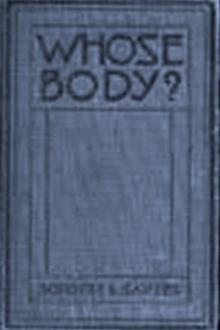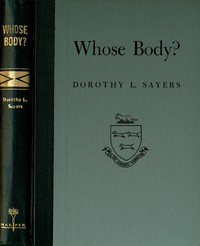Whose Body?, Dorothy L. Sayers [books to read to get smarter .TXT] 📗

- Author: Dorothy L. Sayers
- Performer: -
Book online «Whose Body?, Dorothy L. Sayers [books to read to get smarter .TXT] 📗». Author Dorothy L. Sayers
“Lady Levy seems to have had the knack of makin’ people devoted to her,” said Peter. “Look at the pea-green incorruptible Levy.”
“That’s quite true, dear; she was a most delightful girl, and they say her daughter is just like her. I rather lost sight of them when she married, and you know your father didn’t care much about business people, but I know everybody always said they were a model couple. In fact it was a proverb that Sir Reuben was as well loved at home as he was hated abroad. I don’t mean in foreign countries, you know, dear—just the proverbial way of putting things—like ‘a saint abroad and a devil at home’—only the other way on, reminding one of the Pilgrim’s Progress.”
“Yes,” said Peter, “I daresay the old man made one or two enemies.”
“Dozens, dear—such a dreadful place, the City, isn’t it? Everybody Ishmaels together—though I don’t suppose Sir Reuben would like to be called that, would he? Doesn’t it mean illegitimate, or not a proper Jew, anyway? I always did get confused with those Old Testament characters.”
Lord Peter laughed and yawned.
“I think I’ll turn in for an hour or two,” he said. “I must be back in town at eight—Parker’s coming to breakfast.”
The Duchess looked at the clock, which marked five minutes to three.
“I’ll send up your breakfast at half-past six, dear,” she said. “I hope you’ll find everything all right. I told them just to slip a hot-water bottle in; those linen sheets are so chilly; you can put it out if it’s in your way.”
“—So there it is, Parker,” said Lord Peter, pushing his coffee-cup aside and lighting his after-breakfast pipe; “you may find it leads you to something, though it don’t seem to get me any further with my bathroom problem. Did you do anything more at that after I left?”
“No; but I’ve been on the roof this morning.”
“The deuce you have—what an energetic devil you are! I say, Parker, I think this co-operative scheme is an uncommonly good one. It’s much easier to work on someone else’s job than one’s own—gives one that delightful feelin’ of interferin’ and bossin’ about, combined with the glorious sensation that another fellow is takin’ all one’s own work off one’s hands. You scratch my back and I’ll scratch yours, what? Did you find anything?”
“Not very much. I looked for any footmarks of course, but naturally, with all this rain, there wasn’t a sign. Of course, if this were a detective story, there’d have been a convenient shower exactly an hour before the crime and a beautiful set of marks which could only have come there between two and three in the morning, but this being real life in a London November, you might as well expect footprints in Niagara. I searched the roofs right along—and came to the jolly conclusion that any person in any blessed flat in the blessed row might have done it. All the staircases open on to the roof and the leads are quite flat; you can walk along as easy as along Shaftesbury Avenue. Still, I’ve got some evidence that the body did walk along there.”
“What’s that?”
Parker brought out his pocketbook and extracted a few shreds of material, which he laid before his friend.
“One was caught in the gutter just above Thipps’s bathroom window, another in a crack of the stone parapet just over it, and the rest came from the chimney-stack behind, where they had caught in an iron stanchion. What do you make of them?”
Lord Peter scrutinized them very carefully through his lens.
“Interesting,” he said, “damned interesting. Have you developed those plates, Bunter?” he added, as that discreet assistant came in with the post.
“Yes, my lord.”
“Caught anything?”
“I don’t know whether to call it anything or not, my lord,” said Bunter, dubiously. “I’ll bring the prints in.”
“Do,” said Wimsey. “Hallo! here’s our advertisement about the gold chain in the Times—very nice it looks: ‘Write,’phone or call 110, Piccadilly.’ Perhaps it would have been safer to put a box number, though I always think that the franker you are with people, the more you’re likely to deceive ’em; so unused is the modern world to the open hand and the guileless heart, what?”
“But you don’t think the fellow who left that chain on the body is going to give himself away by coming here and inquiring about it?”
“I don’t, fathead,” said Lord Peter, with the easy politeness of the real aristocracy; “that’s why I’ve tried to get hold of the jeweller who originally sold the chain. See?” He pointed to the paragraph. “It’s not an old chain—hardly worn at all. Oh, thanks, Bunter. Now, see here, Parker, these are the finger-marks you noticed yesterday on the window-sash and on the far edge of the bath. I’d overlooked them; I give you full credit for the discovery, I crawl, I grovel, my name is Watson, and you need not say what you were just going to say, because I admit it all. Now we shall—Hullo, hullo, hullo!”
The three men stared at the photographs.
“The criminal,” said Lord Peter, bitterly, “climbed over the roofs in the wet and not unnaturally got soot on his fingers. He arranged the body in the bath, and wiped away all traces of himself except two, which he obligingly left to show us how to do our job. We learn from a smudge on the floor that he wore india rubber boots, and from this admirable set of finger-prints on the edge of the bath that he had the usual number of fingers and wore rubber gloves. That’s the kind of man he is. Take the fool away, gentlemen.”
He put the prints aside, and returned to an examination of the shreds of material in his hand. Suddenly he whistled softly.
“Do you make anything of these, Parker?”
“They seemed to me to be ravellings of some coarse cotton stuff—a sheet, perhaps, or an improvised rope.”
“Yes,” said Lord Peter—“yes. It may be a mistake—it may be our mistake. I wonder. Tell me, d’you think these tiny threads are long enough and strong enough to hang a man?”
He was silent, his long eyes narrowing into slits behind the smoke of his pipe.
“What do you suggest doing this morning?” asked Parker.
“Well,” said Lord Peter, “it seems to me it’s about time I took a hand in your job. Let’s go round to Park Lane and see what larks Sir Reuben Levy was up to in bed last night.”
“And now, Mrs. Pemming, if you would be so kind as to give me a blanket,” said Mr. Bunter, coming down into the kitchen, “and permit of me hanging a sheet across the lower part of this window, and drawing the screen across here, so—so as to shut off any reflections, if you understand me, we’ll get to work.”
Sir Reuben Levy’s cook, with her eye upon Mr. Bunter’s gentlemanly and well-tailored appearance, hastened to produce what was necessary. Her visitor placed on the table a basket, containing a water-bottle, a silver-backed hair-brush, a pair of boots, a small roll of linoleum, and the “Letters of a Self-made Merchant to His Son,” bound in polished morocco. He drew an umbrella from beneath his arm and added it to the collection. He then advanced a ponderous photographic machine and set it up in the neighbourhood of the kitchen range; then, spreading a newspaper over the fair, scrubbed surface of the table, he began to roll up his sleeves and insinuate himself into a pair of surgical gloves. Sir Reuben Levy’s valet, entering at the moment and finding him thus engaged, put aside the kitchenmaid, who was staring from a front-row position, and inspected the apparatus critically. Mr. Bunter nodded brightly to him, and uncorked a small bottle of grey powder.
“Odd sort of fish, your employer, isn’t he?” said the valet, carelessly.
“Very singular, indeed,” said Mr. Bunter. “Now, my dear,” he added, ingratiatingly, to the kitchen-maid, “I wonder if you’d just pour a little of this grey powder over the edge of the bottle while I’m holding it—and the same with this boot—here, at the top—thank you, Miss—what is your name? Price? Oh, but you’ve got another name besides Price, haven’t you? Mabel, eh? That’s a name I’m uncommonly partial to—that’s very nicely done, you’ve a steady hand, Miss Mabel—see that? That’s the finger marks—three there, and two here, and smudged over in both places. No, don’t you touch ’em, my dear, or you’ll rub the bloom off. We’ll stand ’em up here till they’re ready to have their portraits taken. Now then, let’s take the hair-brush next. Perhaps, Mrs. Pemming, you’d like to lift him up very carefully by the bristles.”
“By the bristles, Mr. Bunter?”
“If you please, Mrs. Pemming—and lay him here. Now, Miss Mabel, another little exhibition of your skill, if you please. No—we’ll try lamp-black this time. Perfect. Couldn’t have done it better myself. Ah! there’s a beautiful set. No smudges this time. That’ll interest his lordship. Now the little book—no, I’ll pick that up myself—with these gloves, you see, and by the edges—I’m a careful criminal, Mrs. Pemming, I don’t want to leave any traces. Dust the cover all over, Miss Mabel; now this side—that’s the way to do it. Lots of prints and no smudges. All according to plan. Oh, please, Mr. Graves, you mustn’t touch it—it’s as much as my place is worth to have it touched.”
“D’you have to do much of this sort of thing?” inquired Mr. Graves, from a superior standpoint.
“Any amount,” replied Mr. Bunter, with a groan calculated to appeal to Mr. Graves’s heart and unlock his confidence. “If you’d kindly hold one end of this bit of linoleum, Mrs. Pemming, I’ll hold up this end while Miss Mabel operates. Yes, Mr. Graves, it’s a hard life, valeting by day and developing by night—morning tea at any time from 6.30 to 11, and criminal investigation at all hours. It’s wonderful, the ideas these rich men with nothing to do get into their heads.”
“I wonder you stand it,” said Mr. Graves. “Now there’s none of that here. A quiet, orderly, domestic life, Mr. Bunter, has much to be said for it. Meals at regular hours; decent, respectable families to dinner—none of your painted women—and no valeting at night, there’s much to be said for it. I don’t hold with Hebrews as a rule, Mr. Bunter, and of course I understand that you may find it to your advantage to be in a titled family, but there’s less thought of that these days, and I will say, for a self-made man, no one could call Sir Reuben vulgar, and my lady at any rate is county—Miss Ford, she was, one of the Hampshire Fords, and both of them always most considerate.”
“I agree with you, Mr. Graves—his lordship and me have never held with being narrow-minded—why, yes, my dear, of course it’s a footmark, this is the washstand linoleum. A good Jew can be a good man, that’s what I’ve always said. And regular hours and considerate habits have a great deal to recommend them. Very simple





Comments (0)